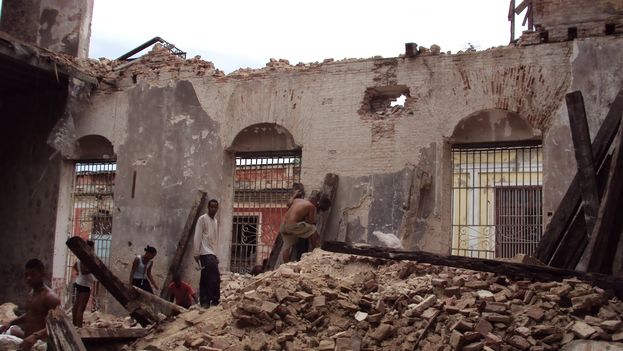
![]() 14ymedio, Caridad Cruz, Cienfuegos, 19 June 2016 — One of the greatest treasures of Cienfuegos, the Goytisolo Palace, lies in ruins amid official apathy to the rescue of this emblematic building in a city declared a World Heritage Site by UNESCO in 2005.
14ymedio, Caridad Cruz, Cienfuegos, 19 June 2016 — One of the greatest treasures of Cienfuegos, the Goytisolo Palace, lies in ruins amid official apathy to the rescue of this emblematic building in a city declared a World Heritage Site by UNESCO in 2005.
Declared a local monument, the Goytisolo Palace, or La Catalana as it is also known, was built by Agustín Goytisolo Lezazarburu, a Biscayan born in 1812 who came to Cuba in search of opportunities in the 1830s.
Known for his reputation as a skilled tradesman, by 1870 he had become a wealthy businessman with hundreds of slaves, the owner of sugar plantations in Hacienda Simpatía as well as the sugar mills of Lequeito and St. Augustine.
By 1847, just 28 years after the founding of Fernandina village of Jagua, now known as Cienfuegos, the Goytisolo family acquired a site on Santa Elena Street at the corner of D’Clouet, for the construction of the building, which it was concluded in 1858.
It was considered an example of the Baroque style and one of the most important house-warehouse buildings of the nineteenth century. At 68 by 123 feet, it had a basement and central courtyard. Among the architectural elements that could be found in the building was an exquisite gate facing Santa Elena Street which appears to have been the coach entrance.
It had stained glass windows on the first floor and in the back, apparently for the warehouse. It also had richly decorated beams, and on the second floor Malaga tiles and Bremen mosaics, bricks and ornate marble intarsia.
Nothing remains of the former splendor. The palace has become an empty shell languishing since it was declared uninhabitable in 2005. The Revolution converted it into multifamily housing. One of these “rooming houses,” in which a house “abandoned” by its owner, fleeing the new economic system, was partitioned into small apartments where dozens of people cohabited.
After the indiscriminate theft of what was an exquisite nineteenth-century building, only ruins remain. Neighbors took the marble floors, and cut and resold the railings. Even the bricks, extracted at the tip of a sacrilegious chisel, were sold. Carpentry was supplied by the beams of the mezzanine.
Local authorities have argued for the demolition of the building, but the Office of the Curator of the City opposed it. In 2012, a part of the wall and the windows of the building collapsed. Since then, the countdown to its total destruction has begun.
Declaring the site a Local Monument is worthless. La Catalana has become a constant concern of scholars of local history who know that not undertaking any restoration sends a dangerous message to the preservation of the heritage of the nation. Nothing can withstand the indiscriminate passage of time and the apathy of the rulers.
